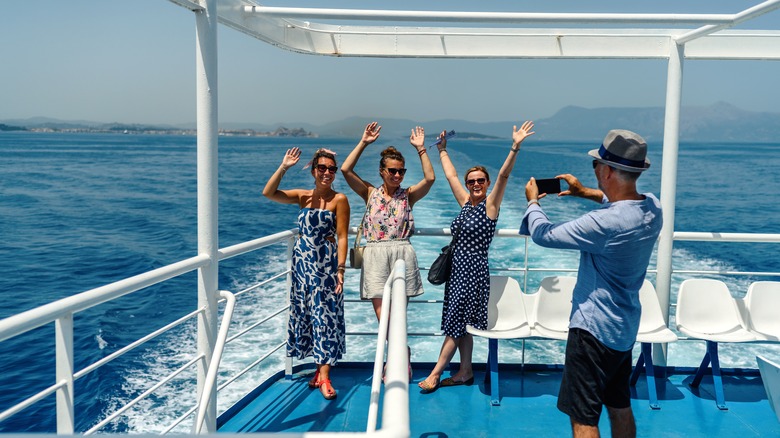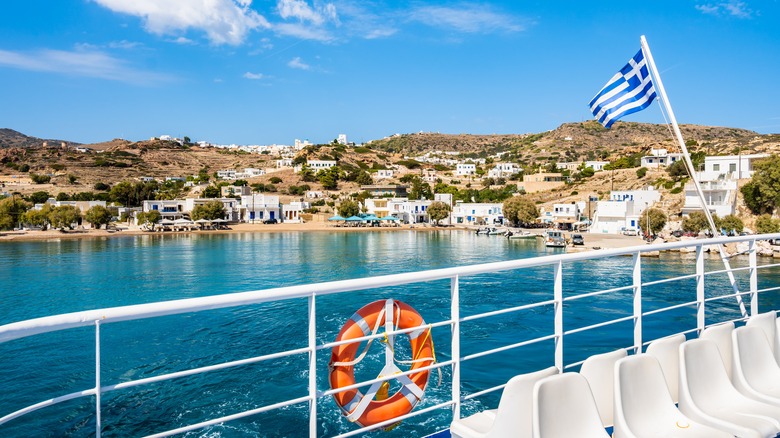The Number One Detail Travelers Say They Wish They Knew Before Taking A Ferry In Greece
If you're heading to Greece for a vacation this summer, you're not alone. Over 36 million people visited this fascinating and historic place in 2023. The European destination is made up of many islands, in addition to parts of the continent proper. There are around 6,000 Greek islands in all, with 227 of those being inhabited. Though you're likely to visit mainland Athens and its beautiful museums first, it's a good bet that you'll be hitting more than one Greek island on your trip. Though you can fly to many of them, you can also take one of the ferries. That might seem like a good option, and sometimes it is. However, you may have issues with things like choppy water, which can lead to seasickness, or the big complaint: delays.
Any form of transportation can be delayed or cancelled, but when you're dealing with ferries, you have to factor in weather and sea conditions. No matter why the ferry doesn't get there on time, it can put a dent in your vacation. That's particularly true if you're visiting several islands and are hoping to have a certain amount of time at your destinations. That said, there is an app that can help you plan, providing info on the best type of ferry to book to help keep delays and cancellations to a minimum. We've also got advice if you get seasick on the water.
How to prepare for a Greek ferry trip
One of the reasons Greek ferries often have delays is that, particularly in the summer, there can be a lot of wind, causing rough water. They may also be loading and unloading cars, as some of the ferries take them along for the ride. One Reddit user said, "In my experience, the more times the ferry stops — and has to go into port, unload passengers cars etc the more likely it will be delayed. Direct ferries, or those with only 1 or 2 stops are by far the most reliable." (They may try to make up some time at the port, so get off right away when you dock, or you could be stuck onboard.)
Weather delays and cancellations are more likely for smaller, fast ferries like Seajet. You have a choice between a smaller one that is faster, and a larger one that is slower and more stable, kind of like a cruise ship. (One good tip is to look for one of the ferries that takes cars to find a larger one.) If you miss a ferry, head to the ferry operator to get booked on the next one. Download the Ferryhopper app, no matter what type of ferry you take. You can compare prices, and check in online. You'll see the length of the trip, find out if it's delayed, and track the ferries in real time. Make sure to arrive at the port at least 30-45 minutes before departure.
Preventing seasickness and final tips for Greek ferries
Greek ferries can be difficult if you get seasick. (In fact, our word "nausea" comes from the Greek word "naus," which means "ship.") Book your ferries early so you can get an idea of the length of the journey and a choice in the size of the boat. Taking some anti-nausea medication like Dramamine before you get on can be helpful. It's worth bringing it with you, even if you don't normally get seasick. You can try natural nausea prevention with foods like green apples and ginger. Book a boat with outside seating if you can, or at least try to sit near a window so you can stare at the horizon (not the water), and don't read or look at a screen. Long, slow breaths can help calm your stomach. If you have kids along, it's a good idea to talk to their doctor before you leave for vacation, as some anti-nausea medications have to be adjusted for weight.
If a ferry is the option you're choosing for travel between the mainland and the islands, you can get a Eurail pass for the ferries here that lets you travel for a certain number of days in a month for one price. It's also important to remember that not every Greek island's port is in walking distance from where you want to go. You'll have to book transportation when you get there.


